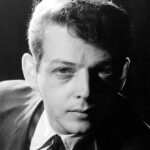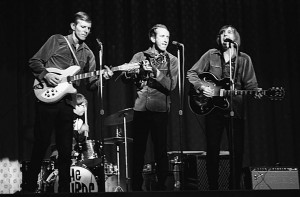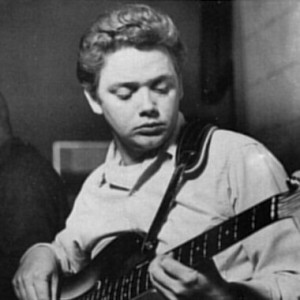-
Featured News
Shel Talmy: August 11, 1937 – November 14, 2024
 By Harvey Kubernik
The legendary and influential record producer Shel Talmy passed away in mid-November from a stroke at age 87.
Talmy arranged and produced the Kinks recordings 1964-1967, “My G
By Harvey Kubernik
The legendary and influential record producer Shel Talmy passed away in mid-November from a stroke at age 87.
Talmy arranged and produced the Kinks recordings 1964-1967, “My G -
Featured Articles
The Beatles: Their Hollywood and Los Angeles Connection
 By Harvey Kubernik
JUST RELEASED are two new installments of the Beatles’ recorded history, revised editions of two compilation albums often seen as the definitive introduction to their work.
Or
By Harvey Kubernik
JUST RELEASED are two new installments of the Beatles’ recorded history, revised editions of two compilation albums often seen as the definitive introduction to their work.
Or -
Doug Dillard
By Domenic Priore
Born to a musical family March 6, 1937 in the Ozark Mountains of Salem, MO, Doug Dillard counted Earl Scruggs as an early supporter. After initial encouragement via postal service the bluegrass legend later installed the tuners to Doug’s very first banjo with his own two hands, after a 500 mile trek by Dillard to the legend’s home with heckled parents in tow. Dillard, a forefather in his own right, was one of the early alchemists—with his group the Dillards—to fuse the soul of rock’n’roll to bluegrass and country music, bringing that peculiar hill-folk music to a ’60s youth generation. He brought down electricity on high from the sky and few have harnessed that instrument before or since with such power, dexterity and skill. Doug left this square world on May 16, 2012, aged 75, in Nashville, TN, of lung infection brought on from a collapsed lung a few months prior. Below our pal Domenic Priore issues the raw facts on the legend. (jeremy nobody esq)
Banjo picker Doug Dillard came out to Los Angeles from his native Missouri with his brother Rodney, Dean Webb and Mitchell Jayne as the Dillards, and quickly helped to popularize bluegrass music as part of the LA Folk scene during the early ’60s at clubs like The Ash Grove, The Troubadour, The Ice House, The Mecca, The Golden Bear and others that made the city a freeway spread-out Greenwich Village of the West Coast. The Dillards were surrounded by a lot of great local bluegrass talent that would evolve into The Byrds ever-growing family tree: the Country Boys/Kentucky Colonels (with Clarence White), the Scottsville Squirrel Barkers and the Golden State Boys (both featured Chris Hillman, the latter featured Chris with Vern and Rex Gosdin). The Dillards were managed by Jim Dickson who would also come to manage the Byrds. When the Dillards made the attempt to electrify in 1965, Jim hired Dewey Martin prior to his taking the drummer spot in Buffalo Springfield. This kind of interaction would play an incredible part in the growth of early Country Rock from its most core hill-bound element.
Donald “Duck” Dunn
By James Porter
“We had a band powerful enuff to turn goat piss into gasoline.”
That was one of Duck Dunn’s speaking roles in the movie The Blues Brothers. He was talking about the latter-day band that he played in with Steve Cropper, the Bar-Kays’ Willie Hall, Memphis Slim’s guitarist Matt “Guitar” Murphy, and, among others, singing actors John Belushi and Dan Aykroyd. But he could have been talking about the band that made him famous—Booker T & the MGs—and made twice as much sense.
Donald “Duck” Dunn, the lynchpin of numerous sessions during the first decade of Stax Records, died May 13, 2012 in his sleep in a hotel in Tokyo, aged 70.
Dunn wasn’t with Booker T & the MGs from the beginning—that’s Lewie Steinberg’s bass you hear on 1962’s “Green Onions”—but, with all due respect to Steinberg, Dunn was in the classic lineup from 1964-71 (and all reunions thereafter). During this period, not only did you hear Dunn providing serious bottom for “Hip-Hug-Her,” “Time Is Tight,” “Hang ‘Em High” and “Melting Pot,” but when the Stax hit machine really started to take off, you could hear him in full force on hits by Otis Redding, Carla Thomas, Eddie Floyd, Sam & Dave, Albert King, and various other luminaries at Soulsville USA (as the marquee outside Stax read). After 1969, the MGs started doing less and less sessions at the label as a younger crew called the Bar-Kays slowly took over. Dunn’s bass skills were legendary enough that he had no trouble picking up outside work, with Muddy Waters, Bob Dylan, Elvis Presley, Jerry Lee Lewis and others. While he didn’t quite have the high profile that his bandmates Booker T Jones and Steve Cropper did (both of whom also had reputations as producers, as well as issuing the occasional solo record), Dunn was still clearly in the mix.

